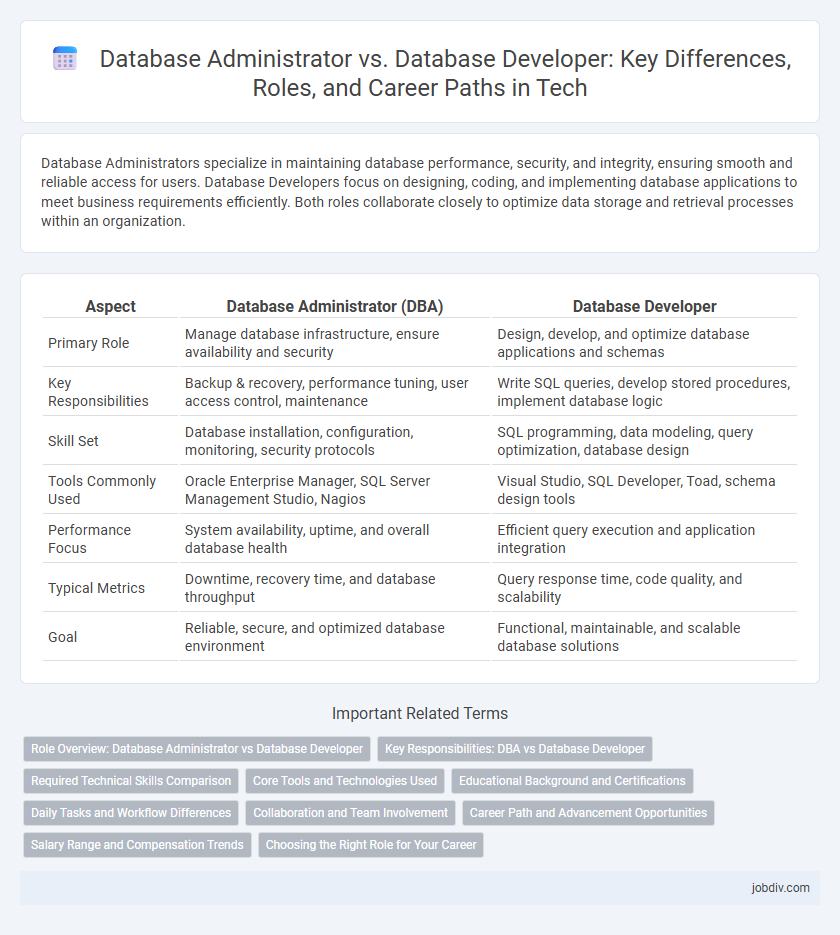Database Administrators specialize in maintaining database performance, security, and integrity, ensuring smooth and reliable access for users. Database Developers focus on designing, coding, and implementing database applications to meet business requirements efficiently. Both roles collaborate closely to optimize data storage and retrieval processes within an organization.
Table of Comparison
| Aspect | Database Administrator (DBA) | Database Developer |
|---|---|---|
| Primary Role | Manage database infrastructure, ensure availability and security | Design, develop, and optimize database applications and schemas |
| Key Responsibilities | Backup & recovery, performance tuning, user access control, maintenance | Write SQL queries, develop stored procedures, implement database logic |
| Skill Set | Database installation, configuration, monitoring, security protocols | SQL programming, data modeling, query optimization, database design |
| Tools Commonly Used | Oracle Enterprise Manager, SQL Server Management Studio, Nagios | Visual Studio, SQL Developer, Toad, schema design tools |
| Performance Focus | System availability, uptime, and overall database health | Efficient query execution and application integration |
| Typical Metrics | Downtime, recovery time, and database throughput | Query response time, code quality, and scalability |
| Goal | Reliable, secure, and optimized database environment | Functional, maintainable, and scalable database solutions |
Role Overview: Database Administrator vs Database Developer
Database Administrators (DBAs) focus on the maintenance, security, and performance optimization of database systems, ensuring data integrity and reliable access for users. Database Developers concentrate on designing, coding, and implementing database applications, including writing complex queries, stored procedures, and triggers to support business processes. While DBAs emphasize system availability and backup strategies, developers prioritize schema design and application integration.
Key Responsibilities: DBA vs Database Developer
Database Administrators (DBAs) are responsible for installing, configuring, and maintaining database management systems to ensure data availability, security, and integrity, including backup and recovery processes. Database Developers focus on designing, coding, and optimizing database schemas, queries, and stored procedures to support application functionality and improve performance. While DBAs manage overall database infrastructure and access controls, Database Developers create and refine the database objects and logic essential for application development.
Required Technical Skills Comparison
Database Administrators require expertise in database installation, configuration, backup, recovery, performance tuning, and security management, with proficiency in SQL, database management systems like Oracle, SQL Server, and MySQL, plus monitoring tools. Database Developers focus on advanced SQL coding, writing stored procedures, triggers, and functions, along with skills in database design, normalization, and integration with application code using languages like Python, Java, or .NET. Both roles demand strong problem-solving abilities and knowledge of data modeling, but Administrators emphasize maintenance and operational stability while Developers prioritize schema development and query optimization.
Core Tools and Technologies Used
Database Administrators primarily utilize tools like Oracle DBMS, Microsoft SQL Server, and IBM Db2 for managing database performance, security, and backups. Database Developers focus on programming languages and development environments including SQL, PL/SQL, T-SQL, and integrated development environments (IDEs) such as SQL Server Management Studio and Oracle SQL Developer to design and implement database schemas and queries. Both roles leverage cloud platforms like AWS RDS and Azure Database to support scalability and accessibility in modern database solutions.
Educational Background and Certifications
Database Administrators typically hold degrees in computer science, information technology, or related fields with a strong emphasis on database management and systems administration. Database Developers often have educational backgrounds in software engineering or computer programming, focusing on database design, coding, and application development. Certifications such as Oracle Certified Professional (OCP) for DBAs and Microsoft Certified: Azure Database Developer Associate for developers validate specialized skills tailored to their distinct roles in database technology.
Daily Tasks and Workflow Differences
Database Administrators primarily focus on managing database performance, security, backup, and recovery tasks to ensure data integrity and availability throughout the enterprise. Database Developers concentrate on designing, coding, and optimizing complex SQL queries, stored procedures, and database schemas to support application development and enhance data retrieval efficiency. While administrators handle maintenance and monitoring activities, developers engage in building database objects and collaborating closely with software engineers to implement new features and database-driven functionalities.
Collaboration and Team Involvement
Database administrators (DBAs) and database developers collaborate closely to ensure robust database management and application performance. While DBAs focus on maintaining database integrity, security, and availability, developers design and implement database schemas and queries tailored to application requirements. Their teamwork is essential for synchronizing database optimization with coding standards, enhancing overall system efficiency and reliability.
Career Path and Advancement Opportunities
Database Administrators (DBAs) focus on maintaining and optimizing database performance, ensuring data security, and managing backups, making their career advancement lead towards roles like Database Architect or IT Infrastructure Manager. Database Developers specialize in designing, coding, and implementing database applications, with progression opportunities into software engineering, data engineering, or solutions architecture. Both career paths require continuous learning in SQL, database management systems such as Oracle, MySQL, or Microsoft SQL Server, and emerging technologies like cloud databases and automation tools to stay competitive.
Salary Range and Compensation Trends
Database Administrators typically earn between $70,000 and $120,000 annually, reflecting their role in maintaining and securing databases, while Database Developers command a slightly higher range from $80,000 to $130,000 due to their involvement in designing and coding database solutions. Compensation trends indicate increased salaries for both roles driven by growing data management needs and cloud database technologies, with developers often receiving additional bonuses tied to application performance improvements. Geographic location and industry sectors, such as finance and healthcare, significantly influence salary variations for these database professionals.
Choosing the Right Role for Your Career
Database Administrators (DBAs) focus on maintaining database performance, security, and backups, ensuring system reliability and data integrity across various platforms like Oracle, SQL Server, and MySQL. Database Developers specialize in designing, coding, and optimizing database schemas, stored procedures, and queries to support application development and business intelligence solutions. Choosing between these roles depends on your strengths: DBAs excel in system management and security, while developers thrive in database design and programming for scalable applications.
Database Administrator vs Database Developer Infographic

 jobdiv.com
jobdiv.com